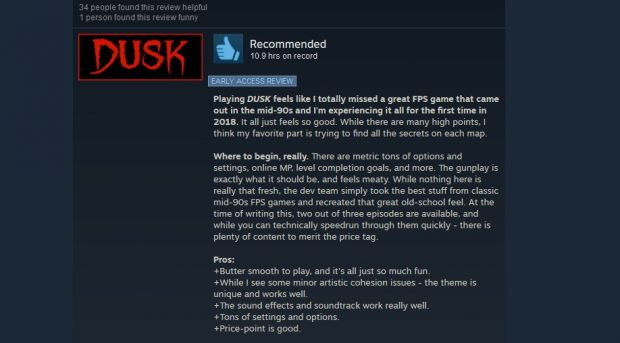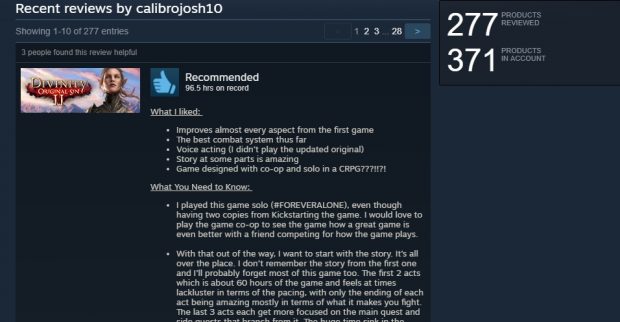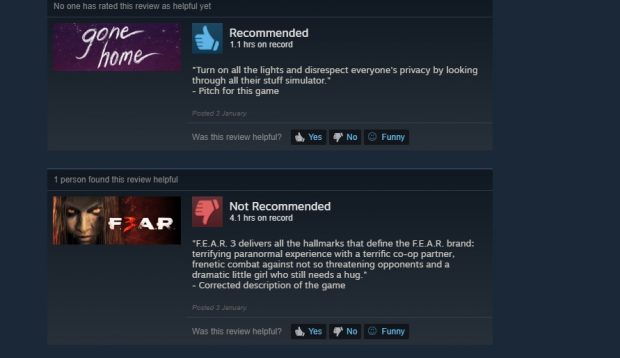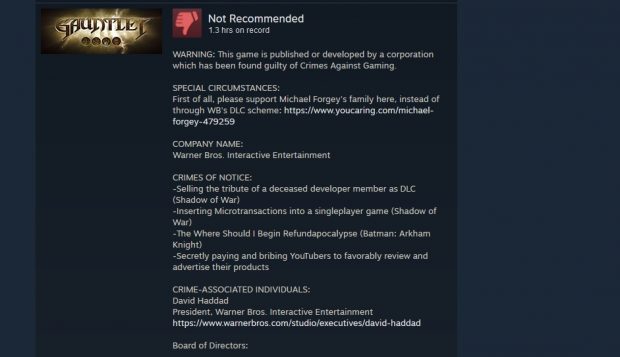Why users write Steam reviews
User approved?
One of the most interesting and controversial features of Steam's user reviews is the system's open-ended nature. Reviews can can range from a couple of lines to thousands of words, can adopt virtually any style, and only need to possess passing relevance to the game in question. What results is a system where thoughtfully written reviews reside alongside jokey one-liners, incoherent rants, and political rallying cries.
This issue has led for some developers to call for more stringent moderation of reviews, either to separate them into different categories or remove certain kinds of reviews entirely. Yet while the opinions of user reviewers are visible for everyone to see, why users are compelled to leave the kinds of reviews they do in the first place is less obvious. Hence, I reached out to several very different reviewers, each of whom has posted a large number of reviews, to find out their motivations behind what they write and why they write it.
Establishing a baseline for the average Steam review isn't easy. This is partly because they're so numerous and varied, but also because of Steam's limited capacity for searching through user reviews. Although it's possible to filter reviews for specific games, it isn't possible to search for reviews by a specific user. So you can't search for the most prolific Steam reviewer, or the user who has the highest “most-helpful” rating.
If you went by the standard of an ideal reviewer from a developer perspective - I spoke to developers about Steam reviews earlier this week - you could do worse than Dr Ryan Dorkoski. Dorkoski is a technician at the Auditory Neurophysiology Laboratory at the University of Ohio, and moonlights as an aspiring game developer, currently working on a social art-sharing game called The Painter's Playground. At the time of writing, he is also the author of 670 Steam user reviews. Since posting his first review in January 2014, this averages out at 3.2 reviews per week.
“I write Steam reviews for two reasons. I write them for my Steam friends, and I write them to force myself to dissect and critically think about game mechanics,” says Dorkoski. “The gaming community lives and dies based off of reviews, and I have always enjoyed reading other gamers thoughts on different titles to help me make purchasing decisions. I have a deep love affair with indie games, and writing reviews is one way I can give back and contribute to the community.”
Beyond the prolific nature of his criticism, Dorkoski is a fairly typical example of an “informative” user reviewer. His reviews generally range between a few hundred to a thousand words, are written in a straightforward and informative style, identify positives and negatives in a clearly listed format and consider value for money. They are largely consistent in structure, though not entirely. Some reviews are only a few lines long, and his review of the Binding of Isaac simply reads “Best game ever.”
Dorkoski epitomises the ideal Steam reviewer from a developer perspective, providing considered and informative feedback that a developer can take into account for current or future projects. However, Dorkoski also has another motivation for reviewing the amount of games that he does. “What happens is if you write a lot of reviews, people friend you so they can see your reviews on their feed. Okay, good. Now what that translates to is my reviews get many upvotes right out of the gate... so my reviews rise to the top fairly quickly in most situations. Then other people see and vote on it.”
In other words, Steam's own systems encourage Dorkoski to review games regularly as it maximises the eyes on his reviews. “I can also further push this by reviewing on a Saturday morning. All weekend it gets upvoted. You also have to review new titles if you want your reviews to get real traction.” It's easy to see how this system could become problematic. By rewarding users for quantity of reviews over quality, Steam's system might encourage users to leave shorter, less explanatory reviews.
It's important to note that Dorkoski is himself a neophyte developer, and so both his views on games and Steam reviews will inevitably be coloured by his own experiences at the coalface of game development. Another prolific Steam reviewer who is not a developer is Joshua Chapin, who has written 277 reviews since 2013 under the username “Calibrojosh10”. Chapin began writing user reviews as a way to digest his own personal experiences with games. “I love talking and discussing games and I don’t have friends that feel the same. So I write about the games as a way to express my joy or disappointment,” he says.
Chapin's reviews have gained a small following due to their detailed and pragmatic structure. They begin with a short bullet-point summary of what he liked, which is followed by a series of longer bullet points under the title “What you need to know.” He also includes his own personal score, the price he paid, the number of hours he took to complete the game, and a list of similar games he recommends. The style is very matter-of-fact, but Chapin's commitment to consistency and precision is impressive. He even keeps a spreadsheet that details information about the games he has reviewed “I love collecting data so I started reviewing and keeping track of my games in the most extremely nerdy, excel-table kind of way.”
Chapin's reviews occupy the extreme end of what Steam terms “informative” reviews. Perhaps unsurprisingly, he has little time for reviews that prioritise humour. “I personally don’t like all joke, meme or purposely stupid reviews as they can just post it in another form elsewhere. I get the personal expression but the stigma of Steam reviews is still seen as garbage and pointless and hurts those trying to put in effort,” he says.
Indeed, many steam reviews that Steam tags as “Funny” are comprised of a single line or a handful of words that may exist purely as the basis for a joke. One reviewer who falls into this category is Mateusz Jabłoński, a Polish user who goes by the username Musk. Jabłoński has written 159 reviews, most of which are one or two lines long, nearly all of which are either a quote from the game or Jabłoński's own, fictionalised quote. His review for Playdead's LIMBO, for example, is:
“Enjoy a happy, colorful adventure through a happy land of Limbo, where everyone is kind and helps you on your journey!" - Totally accurate description.
While his most recent review, of Sven Co-op, is:
"..."
- Gordon Freeman
I asked Jabłoński's why he writes these short and only passingly relevant reviews. His answer, essentially, is that Steam requires him to write something to give the games he plays a rating. “I simply want to add a 'thumbs up/down' to the overall rating of the game, as I feel this is the most important metric here,” he says. “Still, I also didn't want to just write a generic 'it's good/bad'. My first review ended up being a quote, and so I kinda made it a challenge for myself to keep the rest of them this way.”
This raises an interesting point. Users who only want to leave a rating, rather than a review, cannot do so as the two are bound together, and consequently they have to write something in the box, even if, for whatever reason, they don't want to. Jabłoński happily admits that his reviews “aren't meant as useful feedback for the devs”. He simply wants to click a button to give the game a thumbs up or down. Because he can't, he leaves a quick, daft joke instead. Jabłoński suggests, however, that silly reviews may have their own merit independent of providing developer feedback. “It's possible that funny reviews might encourage more people to read and/or write reviews on Steam, which might help the rating system,” he observes.
Joke reviews aren't the only kind of unconventional review that appears on Steam. Some users have found Steam's review system to be a platform from which to take a stand against what they perceive unethical practices in the industry. One of the more vocal “ethical” reviewers goes by the online persona Ghost of Bukowski. The majority of Bukowski's reviews are not related to the content of the game in question, and instead list the “crimes against gaming” by either the developer and/or publisher of the game along with the lead perpetrators of said crime, which is typically the company's executives or board of directors. The companies in question include Valve, Ubisoft, EA, Warner Bros, and Activision.
I wanted to understand why Bukowski was using Steam's review system to wage a personal campaign against these companies, and why he felt the review system was an acceptable vehicle for these accusations. “Writing reviews started as a free association thing, with some way over the top, others small and factual, for fun and variety. Then things changed for the worse in the games industry and I saw an opportunity to address that,” he says. “No matter your preferences; the gaming industry is now being consumed by the same corporate greed that forced people to escape into games, movies, and other forms of entertainment in the first place.”
Bukowski states he wrote his reviews to “inform consumers about predatory tactics”. This includes things like microtransactions, loot-boxes, and paying YouTubers for positive coverage. But it also includes things like tax avoidance or publishers closing certain development studios. Such reviews often form part of what's called “review-bombing” although Bukowski states that his own reviews do not count as review-bombing because “review bombing would have to be done en masse, [but] I’ve only posted this from one computer.”
The intention is to rouse other players from a perceived apathy, and to convince people not to be blindly loyal to a company that has no personal interest in their well-being beyond its ability to profit from them. “Being a 'fan' of any product makes you a tool for people who want to take advantage of you and fellow consumers,” he says. “That doesn’t mean you shouldn’t enjoy a product you bought or got gifted. It means you should be aware of that product or franchise steadily becoming worse because of incessant greed.”
Bukowski's responses to my questions amounted to a 7,000 word document, which ranges widely and delves deeply into the problem of publisher ethics, often through colourful turns of phrase such as “The funeral shirt has no pockets, all that matters is legacy.” Much of it, while not exactly irrelevant, ventures beyond the scope of this article. Within it, however, are some salient points. Bukowski states he placed his reviews on Steam because, “This is the place where the end user sees this info while he's browsing for goods” whereas “A blog or YouTube channel is not guaranteed to inform the consumer about such behaviour.” He also observes that “while I tried to be political because it matters for how joyful the hobby will be or not be, and Steam didn’t like that, others can write 'lol kek' in a review and still get it posted.”
Last year, as part of an effort to combat review-bombing, Steam banned the majority of Bukowski's reviews for “violating Steam's terms of service”. Strangely, this doesn't remove the text from Steam. Instead the reviews cannot be edited by Bukowski. Regarding why these reviews were banned, there's nothing in Steam's terms of service that explicitly prohibits reviews related to perceived company ethics. Rather, it states users must not “artificially manipulate the User Review system or voting/rating systems,” a vague rule that requires interpretation by Steam's administrators. Bukowski himself believes that his reviews were victims of “overzealous moderators”, although that doesn't let Valve off the hook in his mind.
Should 'ethical' reviews be allowed on Steam? Bukowski, of course, thinks so, summarising the exclusion of ethics from criticism in typically colourful fashion - “only review how the lamp works and looks, nevermind that it's made from human skin”. But he isn't alone. “Review bombing is important information that shouldn’t be banned,” says Chapin. “Removing mods, or lots of accidental perma-bans, price increases, or how they handle micro-transactions are all good for users to know.” Dorkorski doesn't comment on review bombing specifically, but does suggest that different kinds of review should be separated.
The issue of ethics in reviews is problematic. While many developers feel that such information is not key to a review, there are other scenarios, such as a developer being discovered to be an ardent racist or misogynist, where it's obvious that some users might not want to support the developer and would want other players to be aware of that as well. On the other hand, this exact tactic is frequently used in far less noble ways, such as to attack games that attempt to represent women and minorities. The question, ultimately, is to what extent is a creative work allowed to stand on its own two feet, apart from the views and actions of its creators or those who finance it and profit from it?
Either way, it is worth bearing in mind this method of reviewing is one of the few options consumers have to ensure developers – and particularly large publishers – pay attention to issues they feel to be important. Bukowski's own reasoning for posting his reviews was he “had this tiny hope that my review musings could help wake up some people.” At a time when publishers are exploring increasingly elaborate ways of making money from games – from loot-boxes to algorithmically-driven content, marketing, and curation, it would be unwise to discount those who question and criticise these practices – wherever those criticisms may appear.
Beyond the issue of ethics, all the users I spoke to feel that Steam reviews should be better sorted and categorised, albeit in different ways. Dorkoski feels there should be two review categories - “actual game content review” and “Game technical review (ie. It won't launch or is too buggy)”. Chapin, meanwhile, would like “an option to filter funny or worthless joke reviews out” or the ability to hide all reviews from a user if they "only post meme reviews”. Jabłoński suggests that “the content of a review should be completely optional. It would let anyone give the rating for a game even if they don't have anything substantial to say.” Finally, Bukowski would like “some kind of feature next to a review saying 'be careful, this company has been accused of shady practices' or some sort.”
Like developers, users for the most part appreciate the free and open nature with which Steam allows them to express themselves. But they also feel Valve could do more to ensure this expression is channelled in more focused directions. In an ideal scenario, Steam would enable everyone to have their say (or in the case of Jabłoński, not have their say) in a way that is constructive and doesn't result in a barrage of noise, but without resorting to a more heavy-handed enforcement of what 'counts' as a review.













